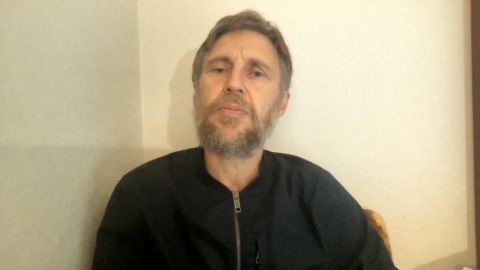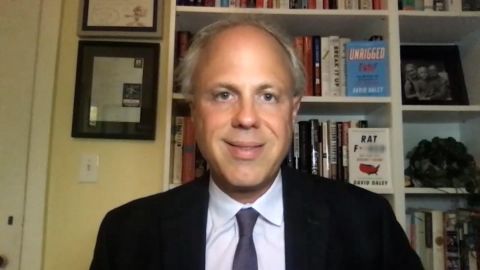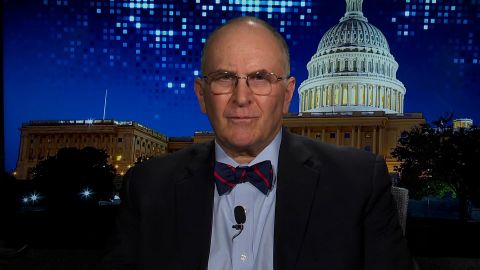Read Transcript EXPAND
BIANNA GOLODRYGA: Well, now, we turn to U.S. politics and the gerrymandering Olympics. At least that’s what our next guest calls it. David Daley is the author of “Unrigged” and he’s referring to the U.S. census releasing its first round of population data. He says, redrawing boundaries is messing with the bedrock of American democracy. Here he is speaking with Hari Sreenivasan.
(BEGIN VIDEO CLIP)
HARI SREENIVASAN: Thanks, Bianna. David Daley, thanks for joining us.
DAVID DALEY, AUTHOR, “UNRIGGED”: Thank you.
SREENIVASAN: So, here we are now, we are seeing the first bits of data trickle out of the most recent census, and I want to ask, you know, what sorts of power shifts do you see in these numbers, whether it’s rural versus urban, one demographic over another?
DALEY: It’s a fascinating set of numbers, absolutely. What we are seeing here is that we are quickly becoming a more diverse nation, we are becoming a less rural nation, and more of us live in big cities or big metro areas than really ever before. So, this is — it sets up a fascinating collision with the redistricting process, which is the other thing that this data really launches the start of the redrawing of congressional and legislative lines around the country. And so, what you’re seeing, especially in states like Florida and Texas and North Carolina and Georgia, are huge growths in the Hispanic, Latino and Asian populations, but that is going to collide with the fact that it is the Republican Party that will have the power of drawing new lines in all of those states. So, the real question, and in many ways, it could be a defining question for the Democratic House majority in 2022 and the state of play for our politics over the course of the next decade, is whether or not Republicans can use redistricting in those states especially as a way to defy demographic trends?
SREENIVASAN: You know, when you rattle off these states, these are also important in the Electoral College. So, what happens in the redistricting ends up also impacting what happens both on the national federal election level, but also on the kind of local representation level. So, even if the people who vote overwhelmingly vote one way, that representation, whether by ideology or party, might not be seen in who holds the levers of power.
DALEY: I think that’s exactly right. And that’s how redistricting really works. When redistricting is twisted for partisan advantage, we call that gerrymandering, and gerrymandering is more toxic and powerful than ever before in all of these key states that we keep talking about as being so contested and competitive and evolving, and who lives there, Florida, North Carolina, Texas, Georgia, Michigan, Ohio, Wisconsin, Pennsylvania, a crucial Electoral College battlegrounds, deeply competitive states, Republicans manage to draw those lines in 2011 in such a way that they did not lose a single state legislative chamber in any of those states over the course of the last 10 years. And after the 2018 election, you had 59 million Americans living in a state in which one or both chambers of their state legislature was controlled by Republicans, even though they had won fewer votes that year. That’s almost one in six of us.
SREENIVASAN: So, for perhaps our overseas audience or even our American audience, how does gerrymandering work, kind of in a nutshell? I mean, there’s these ideas of packing and cracking. When somebody hears your answer, they’re going to say, wait, I don’t get it, what is he talking about? How is it that they could be voting more Democratic but have Republican legislators? What happens?
DALEY: Well, it’s absolutely true. Packing and cracking really are the two key terms when it comes to gerrymandering. If you control district lines and you can decide who is in them and who is out of them, you can draw districts that pack all of the other side’s voters into as few districts as possible. So, they win all of those districts going away, 75, 80, even bigger margins. And then there are fewer of that side’s voters for all of the other districts. So, you can simply crack those voters crosses and dilute other votes. Think of it this way. In Asheville, North Carolina, or in Austin, Texas, these are blue cities, but what Republicans in Texas and North Carolina did when they redrew those lines in 2011 is, in the case of Asheville, they divided it in half and attached it to sort of more rural mountain areas around it. And in Austin, they sliced it up like a pizza into five different slices, and attached each of those pieces to more rural parts of Texas. So as a result, instead of Asheville electing a Democrat, it elects two Republicans. Instead of Austin, blue Austin electing Democrats, those votes are so inconsequential that blue Austin has five districts and four Republican members. So, that’s how it works. It’s a really effective way of trying to gate in the other side’s voters.
SREENIVASAN: You wrote recent that has already led to democracy deserts, what does that mean?
DALEY: What I mean by democracy deserts is that there are huge swaths of the country in which a majority of voters can no longer change their state legislature if they wish to. If you look at a state like Wisconsin, for example, in 2018, you had voters there who re-elect the Democratic senator, Tammy Baldwin, and defeated a Republican governor, Scott Walker, elect Democrats to every statewide office and give Democratic assembly candidates 2,003 more votes than Republican candidates. And yet, that only translated to 36 of the 99 seats. Republicans almost held a super majority even though they lost the overall vote by hundreds of thousands of votes. And that’s also the case in Pennsylvania, it’s been the case in many other states over the course of the last decade. And then you see what those gerrymandered legislators then do once they’re insulated from the voters. They are free to pursue effectively whatever extreme policies that they would like to without any real fear that they can be held accountable at the ballot box. So, this is how you end up seeing reproductive rights bills passed, very draconian ones passed in states like Georgia and Ohio and Missouri, even though they’re deeply out of step, opinion polls show, with the citizens there. It’s how you can see in states like Wisconsin and Pennsylvania state legislators trying to reign in the emergency powers and mask mandates imposed by a Democratic governor, even though they are popular with voters.
SREENIVASAN: So, give me an example of how this might affect the coming election next year.
DALEY: Democrats right now hold a five-seat advantage in the U.S House of Representatives. Through redistricting alone, Republicans could pick up somewhere close to between 10 and 12 seats, in Texas, Florida, North Carolina and Georgia alone. Then they could do additional cracking of blue cities in red states like they did in Asheville and Austin. You could extend that to, say, Kansas City, Missouri, or Louisville, Kentucky, perhaps Memphis, Tennessee, and pick up a handful of seats there. Republicans are already on record at saying that they are going to gerrymander Congresswoman Davids out of her seat in Kansas. And Republicans have complete control of the process in New Hampshire, and they’ve already made clear that they intend to draw themselves one of the two seats there. So, that’s 15, 16 seats you’re talking about. Democrats will be able to impose gerrymanders of their own, perhaps pick up a couple of seats in Illinois and New York, perhaps one in Maryland. But they — the map simply doesn’t favor them when it comes to this kind of outrageous behavior. Republicans could win the U.S. house in 2022 through redistricting alone. And what I think is so dangerous about that, I mean, Democrats won a 4.7 million vote majority in the national popular vote for the U.S. House you could have a situation in which Democrats win by a similar margin, but the House becomes so unrepresentative that gerrymandering alone tips control the other direction. You’ve got Speaker Kevin McCarthy and potentially Speaker Donald Trump.
SREENIVASAN: Because it doesn’t have to be a member of Congress?
DALEY: It does not have to be a member of Congress. There’s already whispers that the former president could be interested in that job. I mean, imagine if redistricting tips the House the other way despite a big majority of voters and Donald Trump is installed as speaker of the House. It sounds ridiculous, but it’s entirely possible.
SREENIVASAN: The Supreme Court has said previously, we’re not going to get involved in this. If Congress wants to change the rules, let them change the rules. But I kind of feel like there’s almost a conflict of interest there. Is Congress going to change their rules that put those specific people into power? Are they going to say, OK, fine, let’s all take our chances and redraw the lines in some sort of mathematically fair way?
DALEY: I think you’ve got your finger on the problem. You know, the U.S. Supreme Court in 2019 declared gerrymandering a non-political issue and they effectively closed the doors of the federal courts to these cases. But we needed the federal courts to step up for that precise reason, because politicians can’t be trusted to do this on their own. They will entrench themselves in office. They have exactly that conflict of interest. It’s why we need the courts to be a neutral and independent arbiter to stand up for the people, to stand up for the very idea of fairness and votes that matter. We’re seeing right now in Congress the debate over the For the People Act, and it, too, now, is running up against one of the small state structural impediments to representative democracy, the filibuster. You need to have 60 votes to get it through the U.S. Senate, even for a vote, and there appears to be very slim path of that actually happening. Senator Manchin and Senator Sinema are opposed to changing the filibuster rule. You have a White House that seems to believe that they can out-organize partisan gerrymandering. I would suggest they ask the citizens of Wisconsin or Pennsylvania exactly how effective that strategy is. You can’t out- organize partisan gerrymandering. That is the essence of its power. And Democrats have this opportunity right now, they have complete control of Washington. They have the presidency, both branches of Congress. I think that they’re extraordinarily likely to lose the House in 2022, largely because of redistricting. However, they have a chance now. They’ve already squandered the first eight months of that opportunity. And if they fail to do anything about this now, given the alarm bells that ought to be going off, just watching what’s happening at state capitols around the country, it will be their, you know, I think, great and enduring historical shame.
SREENIVASAN: This is not just the sort of problem that affects Democrats. I’m assuming that this is also a problem that affects Republicans in heavily blue states. I mean, if we had a more representative system would we find that the country is more purple in more places, or more — you know what I mean? Not everyone in the city of New York is dyed in the wall blue and not everybody in the middle of Tulsa is totally red.
DALEY: And that’s the nature of single member winner take all is if you’re a Republican in New York City or a Democrat in Oklahoma, you effectively have no representation. If we were to transition, and, you know, I know it’s a big lift at a time when doing anything on voting seems so difficult and so partisan, but we are in this really important serious moment in which the country has — is more polarized than perhaps it’s been at any point in time in recent decades. We can’t even have Thanksgiving dinners with each other, right, without mashed potatoes flying across the table. And our politicians are incentivized to behave in all the wrong ways because they are thinking about primaries in the base in wildly uncompetitive districts. And if we had a system that used multi-member districts, larger districts, ranked choice voting, you would see those incentives change almost immediately. You would see Republicans represented in the State of Massachusetts, you would see Democrats from Oklahoma, and then those members would go to Washington and their behavior would likely change. We have not had sort of liberal, New England Republicans or conservative midwestern Democrats in Congress for a long time, and those in many ways are the dealmakers. That’s where the grease is in the system. And right now, we are grinding our wheels.
SREENIVASAN: So, let me try to inject maybe some dose of optimism here. You had your most recent book “Unrigged.” You met with so many different activists working on the ground to try to ensure this democracy. So, in the next few weeks and months is when these maps are drawn. And is that a public process? Is it a behind-closed-doors process? What can a citizen do to have, at the very least, a look at, if not a say in, how their community is categorized and drawn for electoral outcomes?
DALEY: This is why we ought to be optimistic. It doesn’t matter if you are a Republican, a Democrat, or an independent, people of this country hate partisan gerrymandering. If you’re a red state, a blue state, a purple state, when this is on the ballot, when independent commissions, when things that take this out of the hands of politicians are put before the people, it wins with 60 percent, 70 percent of the vote in Missouri, in Michigan, in Ohio, in Colorado, it even wins in Utah. So, voters are on the side of fairness. It’s a handful of politicians trying to hold onto power that are on the wrong side. So, what we have to do is smoke them out. We have to do is insist that these lines be drawn in public, that the process be transparent, that politicians are accountable, because these district lines are the building blocks of our democracy. And when they get warped by partisan politicians into — you know, and twisted for their own intent, it distorts the very nature of democracy itself. And we can’t allow that to happen. Politicians love to have this happen behind closed doors and in closed rooms. They want you to think that it’s confusing, that it’s maps and it’s math and it’s all of these things that a regular person can’t understand. We can all understand this. This is about political power, it’s aboutwhether or not your vote counts, and all of us in this moment have to show that we care about this and that we are going to demand a fair and transparent process.
SREENIVASAN: David Daley, author of the books “Why Your Vote Doesn’t Count” and “Unrigged: How Americans Battle Back to Save Democracy,” thank you so much for joining us.
DALEY: A please. Thank you.
About This Episode EXPAND
Eliot Cohen; Michael Semple; Margarett Lubin; David Daley
LEARN MORE



